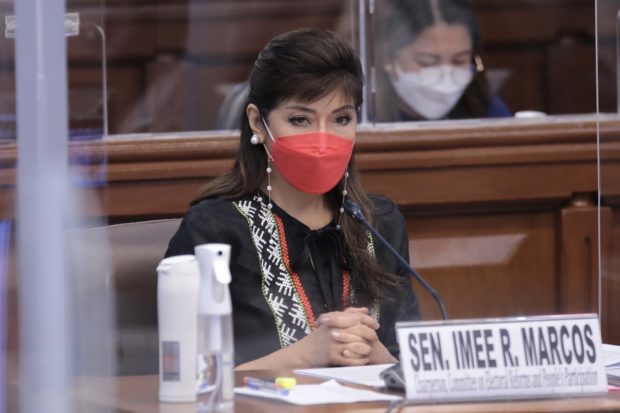
Sen. Imee Marcos during one of the Senate’s proceedings. (File photo by VOLTAIRE F. DOMINGO / Senate Public Relations and Information Bureau)
MANILA, Philippines — The Senate electoral reforms panel chaired by Sen. Imee Marcos, sister of President-elect Ferdinand Marcos Jr., will take a closer look at the May 9 elections and inquire into the problems that marred the polls, such as defective vote-counting machines (VCMs), incomplete voter lists and rampant vote-buying.
But she made it clear that the May 31 inquiry was only aimed at a “general assessment” of the elections in aid of legislation and not to investigate any claims challenging the legitimacy of her brother’s victory.
“This is like the postmortem because after the elections there are still many complaints. Also, what’s most important here are the ways forward, how do we improve on it so we can move on,” Marcos said in a radio interview on Sunday.
“It may be painful for others to hear, but we need to determine the shortcomings,” the senator said.
“As we have seen, the VCMs are from 2009-2010, many of which malfunctioned. There were also many who complained about voter lists and health protocols,” she added.
Marcos said her committee might also take a look at fraud allegations but pointed out that even adding up the complaints would not be significant enough to change the outcome, as noted by election watchdogs like the Parish Pastoral Council for Responsible Voting and the National Citizens’ Movement for Free Elections.
“This is in aid of legislation so we can address issues like the budget [of the Commission on Elections] and the failing VCMs,” she said.
While the automated elections were generally successful, Marcos said she still wished to push for a hybrid mode with a manual component for the tally of votes.
“First of all, I believe we need a hybrid mode, because of the fact that we don’t have a manual count, we don’t have any physical evidence when there’s a protest, like the ERs (election returns) in the precinct,” she said.
“Second, it’s better if people are able to see the manual counting. We are used to seeing that, the tara system, and it’s a good way to generate public confidence,” she said.
“But with the machines, even if we feed the ballots into the machines, we’re hearing accounts, especially from OFWs (overseas Filipino workers), that the ones they voted for weren’t reflected in the receipt. So there’s a level of distrust if all the paper evidence we have is machine-generated,” Marcos said.
She also agreed that vote-buying was rampant during the elections.
“Even on highways, people are lining up for money. That’s no secret. It happened all over the Philippines … Now, it’s not even cash, they’re paying through GCash or PayMaya. This is not right,” she said.
In March, some news outlets aired videos of the distribution of P500 in white envelopes to people after a Marcos rally in Nueva Ecija. The governor later claimed it was part of the regular cash assistance to residents.
RELATED STORIES
Imee Marcos grateful for family’s second chance: We’ve been ‘oppressed’, ‘mocked’ for years
Sotto, Drilon downplay Imee Marcos inclusion in vote canvassing for presidential polls
Imee wants inclusion of ‘pinklawan’ personalities in Marcos Jr.’s admin